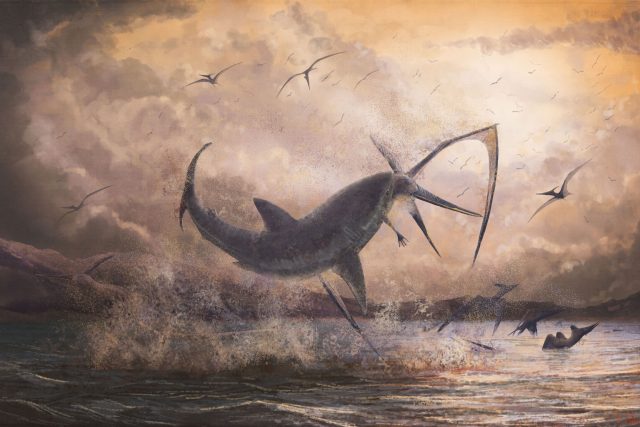MI weekly selection #311
MI weekly selection #311

Shark tooth in pteranodon fossil suggests air-sea battle
A shark tooth has been found embedded in the partial skeleton of a pteranodon that lived during the Late Cretaceous period. “We’ve got good direct evidence that a good-sized shark took a chunk out of a big flying reptile over 80 million years ago,” said Michael Habib, co-author of the study.
Ecological tipping points could interrelate
Earth is facing a number of interconnected ecological tipping points due to warming temperatures that can have a domino effect on the environment, according to findings published in Science. Researchers examined 300 ecosystems and found that nearly half are linked and could trigger major environmental changes, such as increased farmland soil erosion due to rainfall that leads to higher phosphorus levels in waterways and oceans and results in algae blooms that can cause ocean dead zones.
Fossils found by Dead Sea show plants were around pre-mass extinction
Three significant groups of plants existed approximately 5 million years earlier than once thought, meaning they actually survived the mass extinction known as the Great Dying about 252 million years ago. Researchers examined plant fossils found in rocks near the Dead Sea and determined they are about 255 million years old, pushing their origins back past the mass extinction event.
Image shows crater on Mars permanently filled with water ice
The Korolev Crater near Mars’ north pole is permanently filled with water ice, according to images taken by the Mars Express space probe operated by the European Space Agency. The five images taken by the High Resolution Stereo Camera have been composited to depict the crater when seen from the side with the naked eye.
Winter solstice practices offer clues to history of indigenous peoples
Winter solstice rituals can provide researchers with ample information about indigenous peoples and their connection to the world around them, according to University of Montana associate professor Rosalyn LaPier, a member of the Blackfeet tribe. “Although some winter solstice traditions have changed over time, they are still a reminder of indigenous peoples’ understanding of the intricate workings of the solar system,” she writes.